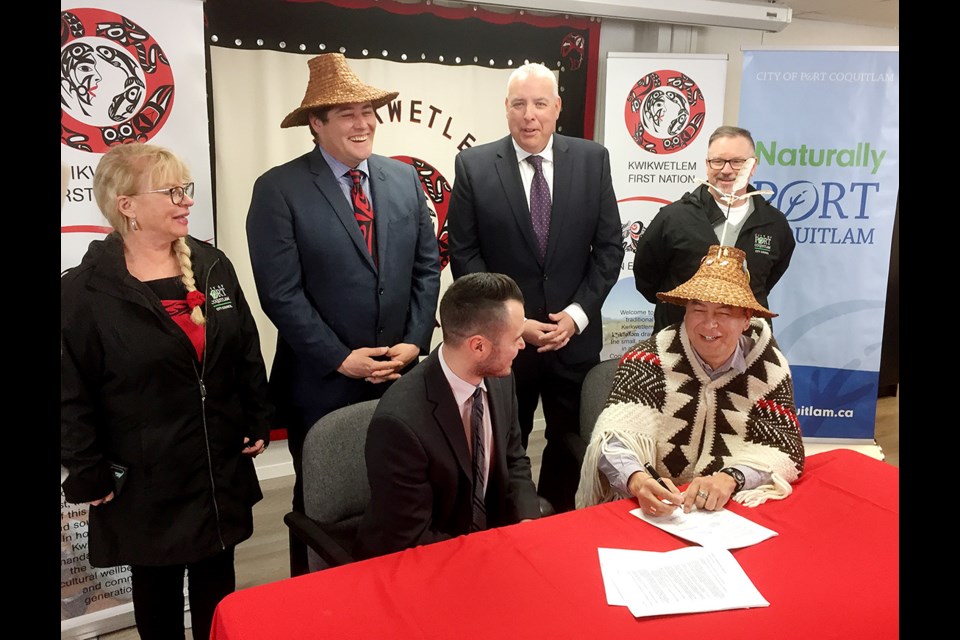Billed as “historic,” the City of Port Coquitlam and kʷikʷəƛ̓əm (Kwikwetlem) First Nation have reached a servicing agreement for a large future development off Pitt River Road.
Monday, April 4, councillors and kʷikʷəƛ̓əm members gathered for the official signing that will set the stage for creating a cultural and economic hub on 30 acres of a 202 acre site.
Chief Ed Hall said the agreement was an important milestone to enable kʷikʷəƛ̓əm to be self-reliant and self sustaining and will “set the table for the younger generation to come.”
The accord, negotiated over dozens of meetings over several years, comes as a result of a decision by the city and the kʷikʷəƛ̓əm to “get this done,” said Port Coquitlam Mayor Brad West.
West said the agreement will benefit both the kʷikʷəƛ̓əm as well as the broader Port Coquitlam community.
It means the city will provide water, sewage, fire, emergency response, storm water management and flood protection for the first stage of development of Coquitlam IR #2, which is one of the reserve lands managed by kʷikʷəƛ̓əm.
As part of the nation’s efforts to revitalize their language and culture, the land has been renamed setɬamékmən, which means “when the tide is high we go.”
Hall noted that for 120 years, “many generations have been trying to move forward in good ways to prosper and do what ever we can to be a strong nation, healthy and vibrant.”
He told the Tri-City News that a detailed land plan is still being worked out and will determine the scope of services.
Among the elements of the vision are housing, a cultural centre, mixed commercial development and possibly a health centre.
He said he anticipates a landscaped development with trees, and “adornment,” which will include First Nations art, wooden sculptures and greeting posts.
“We hope to have a good many of these to put there. It will be a welcoming place,” Hall said.
Among the innovations that could be included are green initiatives, such as solar energy and water-capturing technologies, to help kʷikʷəƛ̓əm become more self-sufficient in energy and water.
“It’s a vision I see,” said Hall, but he acknowledged future generations will likely be carrying out the plan.
Extensive consultation has been carried out with members and the first phase of the land use plan should be complete by the end of the year.
Then the two governments will work together to identify the technical servicing requirements for the planned development.
Costs associated with the servicing agreement require additional negations and will be detailed in capital works addendums.
According to a press release, the agreement will officially take effect once the first building permits are issued by the nation.
West told the Tri-City News that the agreement will bring economic benefits to the city with a light industrial component that will provide “family supporting jobs.”
As well, he noted that Port Coquitlam residents will benefit from the sharing of the kʷikʷəƛ̓əm history and culture.
“It’s really an opportunity for learning and education for the broader community.”
However, he noted there “is still much work to do” between the two governments, which are working on issues of a wider scope in a “reconciliation table” led by the B.C. government.
Among those who attended the ceremony were kʷikʷəƛ̓əm elders, who currently live in housing on the 6.5 acre parcel next to Colony Farm Regional Park.
Known as Coquitlam IR#1, now called slakəyánc, a portion of the land is under construction for 14 units of affordable housing for singles, families and elders.
Beverly Mroczkowski, who was born on the Port Coquitlam parcel known as setɬamékmən, said she’s honoured to witness the ceremony, noting that it's important to those who call the area home.
“Where you come from, that’s where you belong,” said Mroczkowski, 74.
Another elder, Marie Hooper, asked guests to consider what it might be like to live without access to services such as water and sewer. And while she admitted that some were doubtful the agreement would be reached, she said she was always optimistic.
“Sure enough,” she said, “here we are today.”



